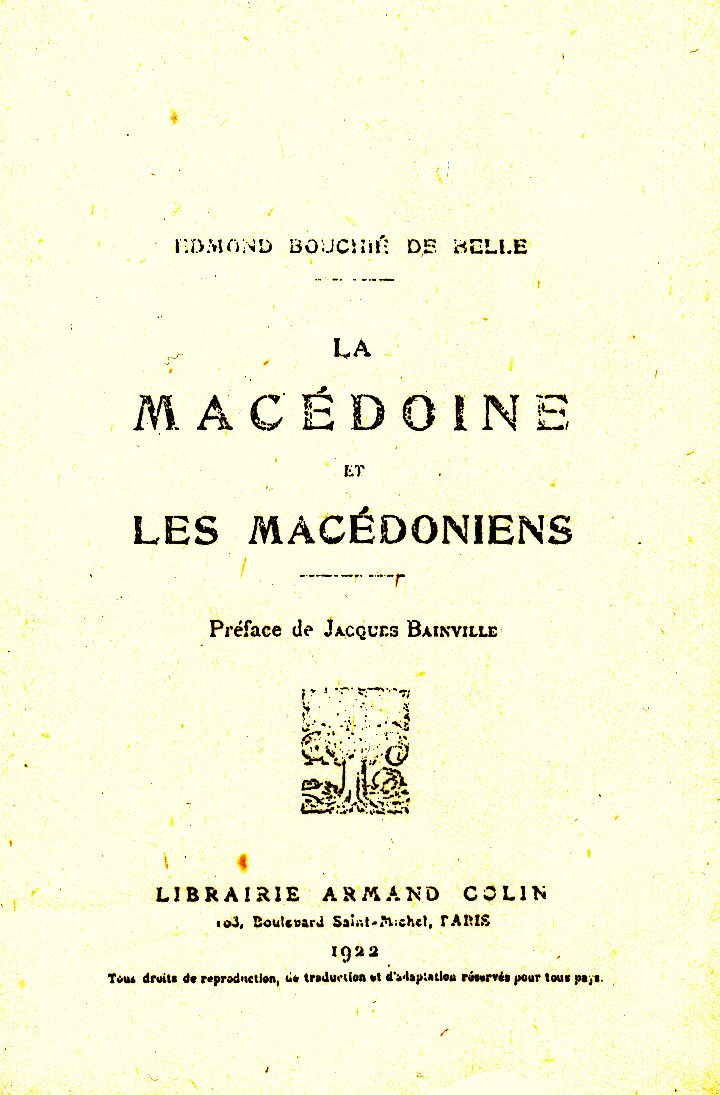„… Тоа е „оспорувана раса“ која себеси не се поистоветува ниту со Бугарите, ниту со Србите. Македонскиот проблем не постои ниту од денес, ниту од вчера. Македонија и Македонците зад себе имаат долго минато, но тие нема да престанат да ја загрижуваат Европа. …“
Прашањето за односот Македонија-Европа де Бел го поставува преку две глобални категории: односот на Србија, Бугарија и Грција спрема Македонија и односот на Европа, односно шест држави, кои наметнуваат својата политика и волја. За првите ќе изрази становиште дека за Бугарија Македонија претставува најголем, најсилен апетит, тоа е најтешко прашање и прашање на национално единство. Србија, не дека нема право на Македонија, туку поради погрешната политика има изгубено многу, иако со Балканската војна добила и непланирано повеќе територија. Грција е опседната од големата идеја, и со Балканската војна зела најголема територија од Македонија. Интересот на големите држави тој ги определува според следните квалификации: Австроунгарија и Германија со својот пангерманизам се експанзионистички расположени спрема исток; Англија настојува да ги сочува клучните патишта, меѓу кои и оние преку Балкан за истокот, Франција нема јасни интереси, Италија да загосподари со Јадран, а Русија се „самоуби“. Според него по крајот на војната најсправедливо решение е санкционирање на поделбата на Македонија, за да се избегнат кавгите меѓу соседите. Во сите варијанти е вклучен и интересот на Македонците, но само како објект на поделба, разместување итн. Бидејќи не наоѓа аргументи да покаже дека вистинскиот фактор во решавањето – Македонците, не може да се одбегне, крајниот заклучок останува, дека Македонија ќе биде предмет на задоволување на туѓите интереси.
(Edmond Bouchie de Belle, born August 23, 1878, Doctor of Law, was a high financial official in Paris, advisor at the Ministry of Finances, and during W.W.I occupied a prominent position in the Headquarters of the French East Army in the Balkans. In its way, de Belle had the opportunity of spending a substantial period of time near the great bend in the River Crna, following the movement of the Army in the vicinity of lake Ostrovo, Lerin, Bitola, Prilip and finally Skopje, where he died on October 20, 1918. During his stay, de Belle wrote a book about Macedonia, which was printed posthumously in Paris under the title Le Macedoine et les Macedoniens in 1922. The book was awarded by the French Academy of Sciences.)
The Macedonian question is not a question of yesterday or today. Macedonia has had a long past behind it, and it will not cease to interest Europe in the future. Europe has come to know Macedonia mainly owing to two facts: one, its geographical position as a
crossroads of world routes -the first, from Belgrade and Novi Pazar through the Vardar valley to Salonika, and the second, the ancient Via Egnatia from Durazzo to Salonika again, while Salonika as Macedonia’s port and according to its importance does not lag behind Constantinople or Suez. Salonika has a dominant position over the East Mediterranean and the routes to Asia.
The second reason is: the population is different in nationality according to its origin and has long since been an object of the tactics of influence by the neighbouring Balkans states, with the support of the Great Powers, the interests of which have been linked with the situation in the Balkan countries…
Macedonia is populated by three groups of nationalities. One of them is the disputed nationality of the Macedonian Slavs, or briefly, Macedonians, which comprise the core of the rural population. Then follow three other nationalities which aim to dominate the Macedonians -the Bulgarians, Serbs and Greeks -and still another three nationalities detached from the dispute -the Wallachians, Turks and Jews. But none of these nationalities populates a defined territory, but appears here and there throughout the country .In all the fields of Macedonia there is a nationality of peasants with a Slav language and of the Orthodox religion. The Bulgarians consider them as being their own “in language and heart,” even citing the Greater Bulgaria, created by the Treaty of San Stefano and the name “Bulgarians” under which the victims of the Treaty of Berlin fought against Turkish oppression. The Serbs consider them as “Serbs” .-since Dusan’s state formerly included “the whole of Macedonia,” according to the manuscripts surviving Turkish subjugation, and since the language was allegedly “Old Serbian” and since the Macedonians celebrated the family “slava” or Saint’s day. Finally come the Greeks, according to whom neither the origin nor the language are of decisive significance, but only the “spirit” and culture, which are allegedly Greek; just as no one can say, for instance, that the French are not Latins, so, too, no one can say that the Macedonians are not “Greeks.” It is obvious that the Macedonian Slavs are not Greeks. And in spite of the fact that they bear some similarities in their character, faith and language with the Bulgarians and the Serbs, they differ from both. You may ask a peasant from the district of Ostrovo, or Bitola, what he feels himself to be, and in nine instances out of ten, he will answer you -Macedonian! Accordingly, the Slav population of Macedonia should be considered as a separate nationality, the name of which would be Macedonian Slavs, or briefly, Macedonians …
Taken from Edmond Bouchie de Belle, La Macedoine et les Macedoniens, Paris, 1922, 80, IV, 303.
Edmond Bouchie De Belle
“La Macedoine Et Les Macedoniens”
Librarie Armand Colin
103, Boulevard Saint-Michel, Paris, 1922

